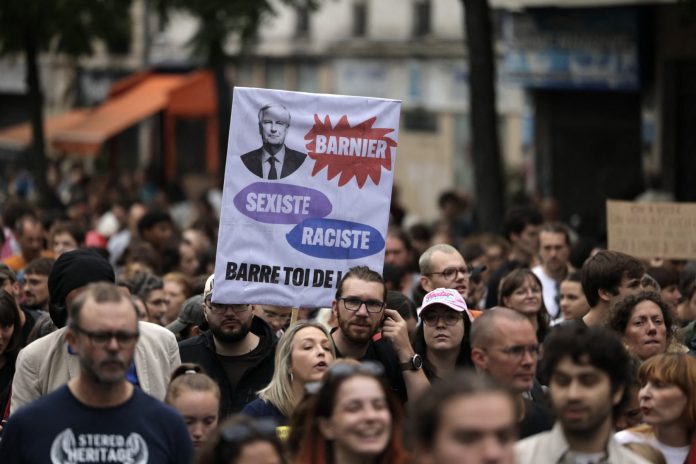Thousands of protesters took to the streets across France this weekend against the new Prime Minister, Michel Barnier, and Emmanuel Macron’s disregard for the results of the parliamentary elections.
In Paris and many other cities, such as Nantes, Nice, and Marseille, people took to the streets to protest. Organisers claimed that around 300,000 people participated in protests across France, including 160,000 in Paris. The police reported that 26,000 protesters in the capital, saying there were no large gatherings.
The protesters disagree with President Macron’s decision to bypass the Prime Minister from the far-left bloc following the deeply divisive results of the parliamentary elections in July. Leftist parties assert that by choosing a former European Union Commissioner, Macron has ignored the parliamentary election results.
Barnier’s party, Les Républicains, represented only the fifth-largest parliamentary group, comprising fewer than 50 deputies. Meanwhile, the most powerful force emerged as the New Popular Front (NFP); however, Macron refused to entrust them with forming a government, as other parties are reluctant to collaborate with the left coalition movement.
The France Unbowed Party contends that Barnier’s conservative past – when he joined over 150 conservatives in the National Assembly to vote against the law decriminalising young homosexuals – disregards the electorate’s will, further intensifying the already tense political atmosphere of France, the second-largest economy in the European Union.
While protests were occurring throughout France, Barnier, who is currently forming his cabinet, expressed a willingness to heed public concerns, particularly regarding public services in France.
As a result, France is now facing a new wave of strikes. According to a poll published on Friday by the Elabe sociological institute, 74 percent of the French believe Macron has overlooked the election results, resulting in a new wave of strikes set to commence on 1 October, as previously announced.
Future of the Prime Minister
The Constitution of France grants the president the right to appoint whomever they wish as prime minister; however, a prospective prime minister must be able to survive a vote of no confidence from the opposition parties. The NFP and RN, together, form a majority and can overthrow the head of government.
The situation is particularly sensitive for the opposition, especially as both camps have opposed some unpopular reform proposals from Macron, notably raising the retirement age from 62 to 64. Moreover, the newly appointed prime minister has indicated that they will support the reform.
RN leader Jordan Bardella, speaking at a fair in Châlons-en-Champagne, urged the prime minister to incorporate his party’s priorities into her agenda, particularly concerning national security and immigration. Bardella informed BFM television that Barnier was a prime minister under scrutiny, adding that without opposition parties, fruitful collaboration would be unattainable. Barnier, in turn, stated he intends to unite the fragmented parliament while also taking a tougher stance on immigration policy.
Barnier, 73, is the oldest individual to serve as Prime Minister in the history of the Fifth French Republic and the successor to the liberal Gabriel Attal, who at 34 was the youngest to hold this position. He was forced to resign after Macron’s government suffered defeat in the snap parliamentary elections in July. Macron called the elections in the hope of securing a clear mandate, but instead they resulted in a hung parliament.
